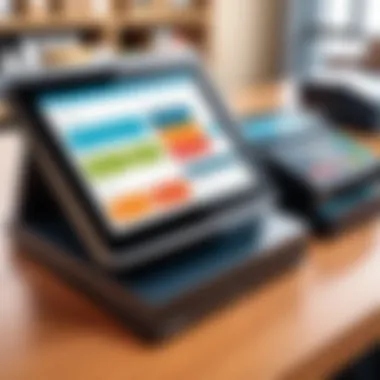Exploring the Epicor Point of Sale System


Intro
In an era where retail dynamics are continuously shifting, the need for effective Point of Sale (POS) systems is more pertinent than ever. This section introduces Epicor Point of Sale, a solution designed to meet various retail challenges. Understanding the functionality of the Epicor POS is essential for businesses looking to enhance customer engagement and operational efficiency. The following sections will delve into the specifics of its features, performance, and user experience, allowing readers to grasp the impact this POS system can have on their retail operations.
Features and Capabilities
Overview of Key Features
Epicor POS is tailored to accommodate diverse retail environments. Some of its prominent features include:
- Real-Time Inventory Management: Enables businesses to keep track of stock levels instantly, reducing the risk of overstocking or stockouts.
- Customer Relationship Management (CRM): Integrates customer data to foster better relationships and personalize the shopping experience.
- Multi-Channel Sales Support: Allows retailers to sell across different platforms, creating a seamless shopping experience.
- Flexible Payment Options: Supports various payment methods, including credit cards, digital wallets, and mobile payments.
- Sales Analytics and Reporting: Provides insights into sales trends, helping to make data-driven decisions.
These features empower businesses to adapt to changing consumer behaviors and preferences, making Epicor POS a compelling option for many retailers.
User Interface and Experience
The user interface of Epicor POS is designed with simplicity and usability in mind. Navigating through the system is intuitive, reducing the learning curve for employees. The layout is clean, with easily accessible features. When using Epicor, users can expect:
- Streamlined Navigation: Employees can quickly move between different functions and screens, thus enhancing transaction speed.
- Customization Options: Retailers can configure the POS interface to match their branding, improving customer familiarity.
- Mobile Compatibility: Epicor POS works on various devices, offering flexibility in customer interactions.
This focus on user experience ensures that employees can operate efficiently, leading to improved customer satisfaction.
Performance and Reliability
Speed and Efficiency
In retail, speed is synonymous with customer satisfaction. Epicor POS is engineered for rapid transactions, ensuring that customers do not experience long wait times. The system is capable of processing multiple transactions simultaneously, which is crucial during high-traffic periods.
Moreover, its efficiency is bolstered by robust integration capabilities, enabling seamless interactions with other systems like inventory and CRM.
Downtime and Support
Furthermore, reliability is a cornerstone of Epicor POS. Minimal downtime ensures that retailers can always engage with customers, even during peak shopping times. Epicor provides comprehensive support to address any issues or inquiries, allowing businesses to focus on their core operations. Users can access support resources through various channels including their website and user forums.
"A reliable POS system like Epicor is an integral part of modern retail strategy, where performance directly impacts customer engagement."
The combination of speed and dependable support cements Epicor’s position as a leading choice among retail professionals.
Epilogue
Epicor Point of Sale offers an extensive suite of features aimed at enhancing retail operations. With its focus on user experience, speed, and reliability, it meets the complex demands of today’s retailers. The following sections of this article will further explore user testimonials, implementation strategies, and the overall implications of adopting Epicor POS.
Prolusion to Epicor Point of Sale
Understanding the Epicor Point of Sale system is essential for businesses in retail and service industries. In a landscape where customer expectations are rising, organizations need tools that can keep pace. Epicor POS provides a framework not just for transactions but for customer engagement, inventory management, and real-time data analysis. This system is a core component of an integrated retail solution, streamlining operations and enhancing overall efficiency.
When we consider the various features of Epicor POS, we see a robust tool that caters to both the needs of businesses and the expectations of consumers. Its user-friendly interface simplifies the transaction process. This functionality is vital in high-paced retail environments where every second counts.
Overview of Epicor Software Solutions
Epicor Software Corporation specializes in enterprise resource planning (ERP) and point of sale solutions for various sectors, including retail, manufacturing, and distribution. The Epicor POS system is designed to integrate seamlessly with other software solutions offered by Epicor, such as ERP. This integration helps businesses gain a more comprehensive view of operations. Users can access vital information at their fingertips.
The software prioritizes flexibility and adaptability. Retailers can customize their system based on specific business needs. Therefore, Epicor serves a diverse range of clients effectively, from small shops to large franchises. With solutions tailored to meet unique requirements, it enables businesses to stay competitive.


Importance of Integrated POS Systems
An integrated POS system, such as Epicor, is crucial for modern retail management. The significance lies in its ability to connect various aspects of retail operations under one platform. This integration leads to improved efficiency and accuracy in processes like inventory management, customer relationship management, and financial reporting.
- Streamlined Operations: By integrating sales, inventory, and customer data, businesses can reduce errors and save time.
- Enhanced Customer Experience: A unified view of customer data helps retailers tailor services and offers, resulting in better customer satisfaction.
- Informed Decision-Making: Real-time data access allows organizations to make more accurate forecasts and strategic decisions.
"Integrated POS systems represent the future of retail management, bringing essential tools together in one place."
Core Features of Epicor Point of Sale
The core features of Epicor Point of Sale are essential to understanding how the system operates within the retail landscape. An effective POS system must not only facilitate transactions, but also integrate various operations seamlessly. Epicor’s features contribute significantly to enhancing efficiency, improving customer interactions, and providing valuable insights to business owners.
User-Friendly Interface
A user-friendly interface is critical for any software, particularly in a retail environment where speed and efficiency are paramount. Epicor POS offers a straightforward, intuitive design that enables staff to perform transactions with minimal training. The layout is clean, allowing quick access to commonly used functions such as sales processing, refunds, and inventory lookups.
The simplicity of navigation ensures that employees can focus on customer service rather than struggling with technology. This feature is especially beneficial during peak hours, where every second counts. The graphical representation of sales, along with easy-to-read buttons, supports a fluid user experience.
Inventory Management Integration
Inventory management is another critical feature of Epicor POS. Accurate inventory tracking is central to successful retail operations. With this POS system, businesses can manage stock levels in real-time. This feature not only reduces human error but also provides immediate insights into stock availability, preventing situations of overselling or stockouts.
Moreover, integration with other inventory systems ensures that stock data remains consistent across various platforms. Automated alerts for low stock help businesses respond promptly. This proactive inventory management leads to stronger supply chain relationships and can improve overall profitability.
Sales Tracking and Reporting
Effective sales tracking and reporting are at the core of making informed business decisions. Epicor POS provides detailed sales reports that can break down data by various criteria, such as product categories, time periods, and employee performance. These insights are invaluable for identifying trends and developing sales strategies.
Business owners can analyze peak sales hours, understand customer preferences, and adjust their marketing strategies accordingly. Access to real-time data encourages a dynamic approach to sales tactics, allowing retailers to capitalize on opportunities as they arise.
Customer Relationship Management
Customer relationship management (CRM) is a vital feature of the Epicor POS. Through integrated CRM capabilities, retailers can capture customer data during transactions. This information can support targeted marketing efforts, allowing businesses to send personalized promotions based on purchasing behavior.
Additionally, the POS’s ability to track customer interactions enables businesses to enhance loyalty programs, tailoring offers to individual customers. Improved customer insight leads to better engagement strategies, fostering long-term relationships and driving repeat sales.
Epicor POS effectively combines these core features to create a robust solution tailored for modern retail challenges. The interface promotes usability, while integrated inventory management, sales tracking, and CRM capabilities offer extensive benefits. Together, these elements make Epicor a valuable tool in optimizing retail operations.
Advantages of Implementing Epicor POS
The implementation of Epicor Point of Sale (POS) system offers numerous advantages, making it a relevant topic for businesses considering upgraded retail solutions. These benefits span customer engagement, operational efficiency, and insights into sales data. In today’s competitive marketplace, having a robust POS system is crucial for enhancing customer satisfaction and optimizing business processes.
Enhanced Customer Experience
A key advantage of the Epicor POS system is its ability to improve customer experience. The user-friendly interface allows staff to process transactions quickly. This efficiency reduces wait times, leading to higher customer satisfaction. More importantly, the integration of customer relationship management features helps retailers personalize service. When employees can access purchase history and preferences, they can offer tailored suggestions. This not only drives sales but also fosters loyalty among customers.
Moreover, mobile capabilities of the Epicor system facilitate browsing and purchases from anywhere in the store. Self-service kiosks and mobile checkout options empower customers, allowing them to engage with the products in a more meaningful way. As a result, the shopping experience becomes more engaging and efficient, enhancing overall customer satisfaction.
Operational Efficiency
Implementing Epicor POS can significantly streamline retail operations. By integrating seamlessly with inventory management, businesses can track stock levels in real-time. This integration minimizes the risk of overstocking or stockouts, ensuring that customer demand is always met. Operational teams can thus refocus their efforts on strategic initiatives rather than routine tasks.
Automation of key functions plays a major role. For example, updating pricing across multiple locations can be done quickly, ensuring consistency. Automated reports on sales performance help management make informed decisions. Tasks that traditionally required significant time have been simplified. Employees spend less time on manual processes and more on providing quality service to customers.


Real-Time Data Insights
Real-time data provided by Epicor POS translates into actionable insights for businesses. Retailers can gain up-to-date information on sales trends and customer behaviors. This information is crucial for making timely decisions about promotions and inventory management.
The ability to analyze data helps identify popular products and peak sales periods. This enables businesses to optimize their marketing strategies and allocate resources effectively. Furthermore, by integrating reporting tools, retailers can easily visualize performance metrics through dashboards. These insights inform future strategies, driving continuous improvement in sales and customer engagement.
"The use of real-time data analytics in retail is crucial for staying ahead in a competitive landscape."
In summary, the advantages of implementing Epicor POS extend beyond just financial gains. They offer a comprehensive solution that enhances customer experiences, improves operational efficiency, and provides valuable insights. This makes Epicor POS a worthy consideration for retailers aiming to elevate their business processes.
Integration Capabilities of Epicor POS
The integration capabilities of Epicor Point of Sale (POS) represent a pivotal aspect of its functionality. In an era where businesses rely heavily on technology, the ability to seamlessly connect with various systems is crucial. These capabilities facilitate a more cohesive interaction between different components of a retail operation. Enhanced integration can lead to increased efficiency, improved customer experiences, and better data management.
Compatibility with Third-Party Applications
Epicor POS is designed to work harmoniously with a variety of third-party applications. This compatibility allows businesses to extend the functionality of their POS system beyond its core features. For example, retailers can integrate payment processing solutions such as PayPal or Square, enabling customers to choose their preferred payment method. Additionally, integration with accounting software like QuickBooks ensures that financial data is easily synced, minimizing errors and saving time during financial reporting.
Incorporating third-party inventory management tools is another significant advantage. These integrations empower businesses to track inventory levels accurately in real-time, ensuring they have optimal stock levels without overstocking. This can be particularly valuable for businesses with large product lines or rapid inventory turnover rates.
Benefits of Third-Party Integration:
- Flexibility: Retailers can tailor the POS system to their specific needs.
- Enhanced Features: Access to new functionalities that may not be available in the standard POS system.
- Improved Efficiency: Automation of various tasks reduces manual workload.
Given these benefits, it’s clear that effective integration enhances the overall functionality of Epicor POS.
Omni-Channel Retailing Solutions
In today’s marketplace, an omni-channel approach is essential for success. Epicor POS supports omni-channel retailing, allowing businesses to create a unified shopping experience across different channels such as in-store, online, and mobile. This capability is particularly vital as consumers expect a seamless transition between various platforms during their shopping journey.
With Epicor POS, retailers can manage inventory and customer data in a centralized manner. For instance, a customer might purchase an item online and choose to pick it up in-store. The system can track the inventory accurately and ensure that the item is reserved for that customer. This not only enhances customer satisfaction but also drives sales by reducing missed opportunities. Additionally, retailers can analyze data from various channels to better understand customer behavior and adapt their strategies accordingly.
Key Features of Omni-Channel Solutions:
- Unified Inventory Management: Real-time updates across all channels.
- Customer Data Integration: Consistent customer profiles regardless of the shopping method.
- Flexible Fulfillment Options: Options like ship-from-store or buy-online-pickup-in-store enhance convenience.
"An effective omni-channel strategy is not just a competitive advantage; it is a fundamental business requirement in today’s retail landscape."
Challenges and Considerations
In the deployment of Epicor Point of Sale systems, several challenges and considerations deserve attention. Understanding these aspects is crucial for businesses contemplating this software. Many organizations want to harness the power of Epicor POS to enhance their operations, but they must also navigate specific obstacles that could affect implementation and ownership.
Implementation Obstacles
Implementing Epicor POS can be a complex process. Organizations often face integration issues with existing systems. Transitioning from a legacy system to Epicor can lead to complications, especially if data migration is involved. Businesses must invest time and resources to ensure that data from older systems is accurately transferred to the new platform. Additionally, staff resistance can occur during training sessions. Employees accustomed to prior systems may be reluctant to adapt to new interfaces and workflows.
Moreover, varying levels of technical expertise among employees can hinder successful implementation. Companies should focus on providing comprehensive training programs. Addressing these implementation obstacles upfront can ensure smoother transitions and ultimately maximize the system's effectiveness.
Cost of Ownership
The cost of ownership for Epicor POS encompasses various factors besides the initial purchase price. Ongoing expenses include licensing fees, maintenance costs, hardware investment, and potential upgrades. Businesses should prepare for these ongoing financial commitments in their budgeting process.
Another aspect to consider is the potential for downtime. System failures can lead to lost sales and, consequently, revenue losses. Investing in robust support services is essential to minimize downtime and maintain operational efficiency.


"A well-calibrated understanding of both implementation and ownership costs can lead to a more strategic adoption of Epicor POS."
User Feedback and Case Studies
User feedback and case studies are essential components in understanding the real-world implications of the Epicor Point of Sale system. Evaluating feedback from actual users provides crucial insights into usability, performance, and the efficiency of the system in various retail environments. These reflections highlight the experiences of businesses that have implemented Epicor POS, offering both uplifting successes and notable challenges.
Furthermore, case studies allow us to analyze these experiences systematically. They present tangible data and quantifiable outcomes that underline the benefits and limitations associated with the software. By studying these aspects, stakeholders can make informed decisions based on evidence rather than sales pitches.
Success Stories from Retailers
Retailers across different industries have reported significant improvements after adopting Epicor Point of Sale. For example, a mid-sized clothing store in California showcased a 30% increase in overall sales within the first quarter of implementation. Through seamless integration with inventory management, the store was able to provide real-time stock updates to avoid potential stockouts, which often lead to lost sales opportunities.
Similarly, a grocery chain in Texas noted that customer checkout times reduced by over 40%. This efficiency was primarily due to the user-friendly interface of Epicor POS, which streamlined transaction processes for both cashiers and customers. Additionally, integrating customer relationship management helped the grocery chain personalize promotions, leading to better customer retention and satisfaction.
These kinds of illustrative examples demonstrate the adaptability of Epicor POS across various retail sectors, showing how they not only enhance operational workflow but also foster engaging customer experiences.
Common Areas of Concern
While many retailers celebrate their successes with Epicor POS, common concerns also arise within user feedback. One prominent issue is the learning curve associated with the software. New users often find it challenging to navigate the system initially. Despite the training provided, some employees may still experience friction adapting to new technology. This is especially true for businesses that had previously relied on older, simpler systems.
Another concern is the cost of ongoing support and updates. Users have voiced that while the initial investment is reasonable, additional costs can accumulate over time. This includes fees related to software updates, maintenance, and customer support which, while crucial, sometimes feel burdensome to smaller retailers.
In summary, evaluating user feedback offers a well-rounded understanding of the Epicor Point of Sale system. By analyzing success stories, we can celebrate the achievements it enables. However, addressing common concerns remains vital for businesses considering its adoption. Engaging directly with user experiences ensures that prospective customers can navigate their decisions with greater awareness.
Future of Epicor Point of Sale
As the retail landscape continues to evolve, understanding the future of Epicor Point of Sale (POS) is crucial for stakeholders in this industry. The pace of technological advancement and changing consumer behavior directly influences how businesses will operate. By examining trends and customer expectations, we can foresee how Epicor POS can adapt and thrive.
Trends in Retail Technology
The retail technology ecosystem is shifting rapidly. Notably, artificial intelligence and machine learning are gaining prominence in POS systems. These technologies help businesses analyze vast amounts of data for better decision-making. Epicor POS is expected to integrate advanced analytics, allowing retailers to personalize customer experiences more effectively.
Another significant trend is the rise of mobile POS systems. With the increase in mobile commerce, having a flexible and portable solution is vital. Retailers can engage customers wherever they are in the store. Epicor’s development of mobile capabilities will provide businesses the tools to enhance service levels.
Furthermore, cloud-based solutions are becoming standard. This model offers scalability and immediate access to updated features. Retailers using Epicor POS can benefit from lower upfront costs and easier updates. With this shift, security will also be a priority. Epicor will focus on ensuring customer data protection as threats evolve.
"We are entering a new era in retail where technology doesn't just support sales but transforms how we work and connect with customers."
Evolving Customer Expectations
As technology changes, so do expectations from consumers. Today’s customers demand more from their retail experiences. They expect fast transactions and immediate service. They also crave personalized experiences tailored to their preferences. Epicor POS systems must adapt to these needs, providing seamless integration between online and offline channels.
Moreover, sustainability is an emerging expectation. Many customers prefer to shop from brands that demonstrate environmental consciousness. Epicor can play a role here by offering solutions that help businesses track their sustainability efforts.
Finally, evolving expectations around customer engagement will require Epicor to enhance CRM functionalities. Retailers will need tools that offer deeper insights into customer behavior. Data-driven strategies will help businesses anticipate needs and build loyalty.
In summary, the future of Epicor Point of Sale is tied to technological advancements and changing consumer expectations. By recognizing these patterns, businesses can leverage Epicor's capabilities to maintain competitive advantages in retail.
End
In summarizing the exploration of Epicor Point of Sale (POS), it is essential to underscore its significance across various dimensions of the retail landscape. This article has examined numerous facets including core features, integration capabilities, user feedback, and future trends. Each of these elements contributes to a broader understanding of how Epicor POS functions not just as a transactional tool but as a critical component for successful retail operations.
Final Thoughts on Epicor POS
The Epicor Point of Sale platform is designed to enhance the efficiency and effectiveness of retail businesses. Its user-friendly interface allows for seamless transactions, while the robust inventory management system ensures that stock levels are adequately maintained. The integration of customer relationship management features promotes stronger engagement, making it easier for retailers to tailor their offerings to meet customer needs.
Moreover, the ability to integrate with various third-party applications expands the functionality of the POS system, making it adaptable for different retail environments. Retailers are increasingly recognizing that having a flexible and responsive POS system can lead to better data insights and improved operational efficiency.
Epicor POS does not merely process sales; it offers insights that can drive strategic business decisions.
However, it is important for potential users to weigh challenges such as implementation costs and possible obstacles during deployment. Understanding these factors is crucial for making informed decisions about adopting this technology. With the retail sector continuing to evolve, Epicor POS positions itself as a forward-thinking solution that aligns well with the shifting expectations of consumers.







